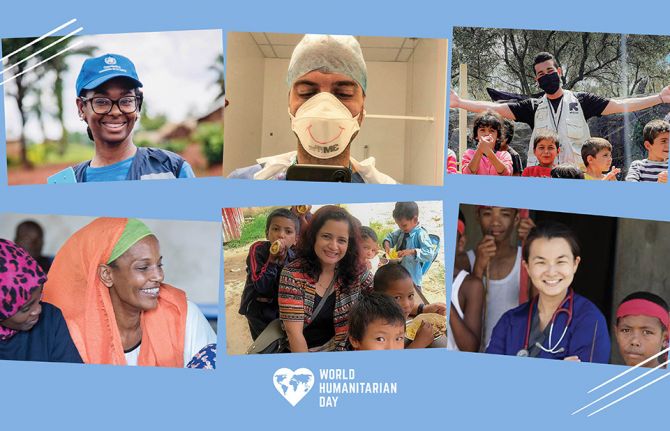

Press Statement
On World Humanitarian Day, UNAIDS celebrates the work of #RealLifeHeroes
19 August 2020 19 August 2020GENEVA, 19 August 2020—Today, on World Humanitarian Day, UNAIDS acknowledges and celebrates the power of communities – the individuals and groups who work together to make a difference to themselves and to each other—the #RealLifeHeroes.
UNAIDS knows that people are stronger together and that communities have always been a cornerstone of the response to HIV. Heroes stand up to ensure they and their families, partners and friends can access HIV testing, treatment, and care services. They stand up to counter stigma and discrimination. They demand respect and engagement in decisions that affect their lives.
Humanitarian and fragile settings are unstable, unpredictable and volatile places. Conflict, disaster, and displacement deplete health services, isolate communities and increase vulnerabilities –increasing the numbers at risk of being left behind. Moreover, as we have seen with COVID-19, every setting can be fragile in the face of new or sudden challenges. As COVID-19 has spread across the globe, humanitarians are being joined by health workers, key workers and others who risk themselves and their families to help others.
Community-led organizations are providing a lifeline to underserved, marginalized and hard-to-reach populations around the world. They have a depth of experience in creating and delivering responses to health and human rights crises within their communities. The many community-led networks and groups that emerged to respond to HIV possess immense practical experience, organizational strength and capacities to facilitate the delivery of life-saving support, and for influencing people’s real-life practices to better protect their health.
And new heroes are emerging too. Some are helping to maintain access to lifesaving HIV treatment. Others are supporting the most vulnerable members of society to survive lockdown and other impacts of the pandemic, and to protect those at risk of violence.
UNAIDS salutes all of these #RealLifeHeroes and the communities who stand beside and around them on the front line, building grassroots resilience so that no one is left behind in the aim for universal health coverage, including free and fair access to HIV-related services.
UNAIDS commits to building a culture of solidarity, trust, kindness and an ethic of care – not only in our response to COVID-19, but across all humanitarian settings. We have seen how many individuals have put their hands in their own pockets to help their families, neighbours and peers, and we call on continued funding for community organizations.
UNAIDS pledges to continue to support and advocate for those working to end suffering and injustice, to promote peace and sustain human rights.
Not just today, but every day.
UNAIDS
The Joint United Nations Programme on HIV/AIDS (UNAIDS) leads and inspires the world to achieve its shared vision of zero new HIV infections, zero discrimination and zero AIDS-related deaths. UNAIDS unites the efforts of 11 UN organizations—UNHCR, UNICEF, WFP, UNDP, UNFPA, UNODC, UN Women, ILO, UNESCO, WHO and the World Bank—and works closely with global and national partners towards ending the AIDS epidemic by 2030 as part of the Sustainable Development Goals. Learn more at unaids.org and connect with us on Facebook, Twitter, Instagram and YouTube.
Press centre
Download the printable version (PDF)
